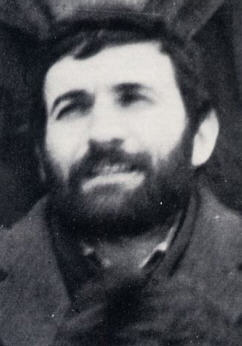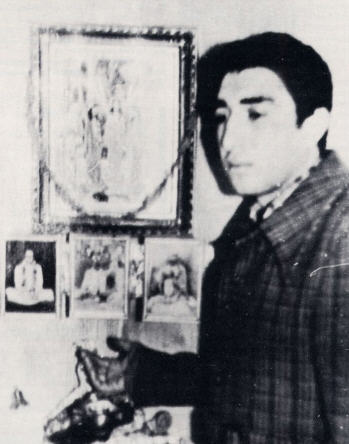The only “prisoner of conscience” to die in a Soviet labor camp last year, Sacisuta dasa had led a life of heroic service to Krsna
Sannyasa dasa (Suren Karapetyan), a Soviet devotee of Krsna, wrote the following short biography in memory of his heroic God-brother who died last December in a Soviet labor camp in Siberia. Sannyasa dasa was himself recently released from a psychiatric hospital in Soviet Armenia, where he had been suffering severe persecution because of his participation in the Hare Krsna movement. He is one of the main devotees responsible for the printing of many thousands of Srila Prabhupada’s books in Russian and Armenian within the USSR. The Hare Krsna devotees in the USSR have earned distinction because of their courageous preaching. Here is an account of one very special Soviet devotee by another.

Sannyasa Dasa
I first met Sacisuta dasa (Sarkis Ogad zhanyan) in January 1985. I had pneumonia then, and for that reason I was living at Kamalamala’s home. Sacisuta and Sarvabhavana (Gagik Buniatyan) came for the first time then. They had heard about Krsna consciousness from some impersonalists, and Kamalamala was preaching to them about deep philosophical matters not the kinds of things we would usually speak to newcomers about. The two young men listened to Kamalamala with great attention, without saying anything. I thought that they would not understand him, but I was wrong. Although they appeared very serious and did not express their joy, they demonstrated it in another way: they gave up smoking hashish that same day.
Sacisuta and Sarvabhavana had been classmates in high school and were intimate friends. Before meeting the devotees, they had learned a little Indian philosophy. They were aware of the principle of ahimsa(nonviolence) and were vegetarians. After graduating from high school, they were sent to the army. In the army it was very difficult not to eat meat, but they were determined. They even suffered persecution for being vegetarians, Sacisuta was regularly beaten by soldiers and officers.
Sacisuta would speak very little. One might get the impression that he had no emotion. But he was relishing deeper, spiritual emotions. He was so attached to Krsna that he would constantly chant the holy name of the Lord. I had never seen such a person before; I had only read about such devotees in Caitanya-caritamrta. I never saw Sacisuta idle. He was always serving his spiritual master and Krsna. If he was not engaged in producing and distributing books, he would wash the floor or the pots and dishes.
Whatever Sacisuta did, he did very conscientiously. He would always chant while doing his service. After the devotees took prasadam, it was usual for everyone to sit down and relax. Sacisuta, however, would immediately get up and wash all the plates. He would never allow anyone to wash his plate. He took great pleasure in serving the devotees.
Once I was going to wash my pants and had put them into a bucket of water. I went to another room for five minutes, and when I returned I found that my pants had been washed and hung up to dry. When I asked Sacisuta why he had washed my pants, he said nothing and simply smiled.
Sacisuta always took prasadam with great pleasure and respect. Kamalamala, as if he could predict the future, would give Sacisuta huge quantities of prasadam. It would even sometimes fall off the plate. Kamalamala would say, “Please take prasadam, dear Sarkis. Eat it when we have it. Tough times may come we may be in prison with nothing to eat.”
Sacisuta’s favorite activity was distributing Srila Prabhupada’s books. He distributed more than any other devotee in the USSR. He would go out every morning with one hundred books and would return in the evening and place whatever money he had collected on the altar. To distribute books was very dangerous then, especially in Armenia. The KGB would follow us at every step.
I do not know if it was good or bad, but Sacisuta was never careful. He just did not know how to be careful. He was completely open when he distributed books. It was as if he were unaware of which country he was living in. Therefore, it became routine for the KGB agents to catch Sacisuta distributing books. Each time they would let him free, but under the condition that he would not distribute books again. When they caught him for the fourth time, Sacisuta was carrying seventy of Srila Prabhupada’s books. The KGB said, “Sarkis, it is you again!” Sacisuta acted as if he had never been caught before and said, “What’s the matter? Did I do something wrong?” Again they let him go.
Sacisuta, Sarvabhavana, and Advaita Acarya were concerned that while many books had been distributed in Yerevan (the capital of Armenia), not so many had been distributed in other cities of the Soviet Union. Therefore, they took several hundred books and went to Russia.
In the city of Pyatigorsk, Sacisuta was again caught. He was charged with illegal distribution of literature and was put into a local jail. He did not have any documents with him, and when the police asked his name and address he invented a new identity. The police sent an inquiry to Yerevan to find out about the name and address Sacisuta had given them. Of course, they found there was no such person and no such address. They asked him a second time, and he again concocted an identity. He was sure that if they discovered how many times he had been arrested for distributing books, they would certainly prosecute him.
Sacisuta was in this jail for eleven days. He ate nothing. He only prayed to Krsna for help. On the eleventh day of his stay in jail, the local authorities decided to move all the prisoners to another location. Along with several other prisoners and guarded by two militia men, he began walking to the new jail. On the way, one prisoner asked to drink water from a spring, and one militia man went with him. Some of the other prisoners, along with Sacisuta, began to run in different directions. Because the second militia man had to guard the rest of the prisoners, he couldn’t follow those who were escaping. Sacisuta escaped very easily.
The railway station was not far away. Sacisuta was lucky because the Moscow-Yerevan train was standing at the station. He did not have much strength because of not eating for so long. He climbed onto the car and asked the conductor if he could go to Yerevan without paying. The conductor kicked him off the train. He got onto another car without being noticed by anybody and hid up on a luggage rack all the way to Yerevan.
This whole time we were greatly worried about Sacisuta, and finally he appeared, skinny and weak.
In January 1986, Sacisuta, along with Sarvabhavana and Advaita Acarya, was again arrested. Sacisuta’s situation was very difficult. The prison administration would arrange for other prisoners to harass him and beat him. All day Sacisuta would sit under a blanket and chant. His diet consisted of only four hundred grams of bread each day, and the bread was often inedible.
Kamalamala, Atmananda, and I had been arrested in November 1985, and in March 1986 we met Sacisuta and the other two devotees at the Yerevan Sovetashen Psychiatric Hospital. They told us everything about their life in prison. Their trial was just a joke. There were no witnesses or victims. They had not said anything to defend themselves at the trial because they saw that it was futile. Everything had been arranged, like a drama on a stage.

Sacisuta was sentenced to two years, Sarvabhavana was also sentenced to two years, and Advaita Acarya was sentenced to three years because of a prior arrest. After the trial, KGB agents offered them freedom if they would reject Krsna consciousness; otherwise, the KGB promised, they would be sent to Siberia, where they would be imprisoned until the last day of their sentence. There would be no chance of an early release or a probation. Of course, it was out of the question for the devotees to reject Krsna, and the KGB sent them to Siberia.
Before they went to Siberia, the chief of the prison in Yerevan called Sacisuta to his office for a discussion. The chief, whose name is Kazaryan, spoke to Sacisuta for hours about atheistic philosophy, trying to convince him that the soul and God did not exist. Sacisuta kept silent for a long time, and the chief thought that he was creating some doubt in Sacisuta’s mind. Finally, Kazaryan asked him what he thought, and Sacisuta answered, “Yes, there is a soul, and fulfilling the needs of the soul is more important than fulfilling the needs of the body. The purpose of life is to surrender to God.” Kazaryan was exasperated with Sacisuta and concluded that it was useless to try to convert him.
Sacisuta sent us letters from the labor camp in Siberia. He said it was very difficult for him to associate with the criminals imprisoned with him. In a letter dated October 1,1987, he said, “What can I tell you about myself? I still chant sixteen rounds and follow the four regulative principles, but I do not think I can consider myself a disciple of my guru. In this tuberculosis hospital my consciousness has become very polluted and I commit many mistakes. . . . As for my health, it is difficult to breathe, and my stomach hurts.”
In his last letter Sacisuta said, “Dear Prana dasa, I will be released on the 23rd of January, 1988.1 doubt that I will be able to return to Yerevan by myself. It would be nice if someone could come to meet me. Please tell Haridasa Thakura dasa and Nityananda Rama dasa to kindly come and take me back to Armenia. Please come and take me. It is really important if someone has the time to please come to take me home. Your little brother, Sarkis.”
Sacisuta passed away on December 26, 1987, less than one month before his scheduled release from the labor camp.
The KGB many times offered Sacisuta freedom in exchange for even formal rejection of Krsna consciousness, but he could never compromise, even formally. In his life there was nothing more valuable than Krsna consciousness. He knew that being in the labor camp was dangerous for him, yet he preferred to remain there rather than to reject Krsna. Sacisuta dasa was willing to sacrifice everything for Krsna even his very life.
